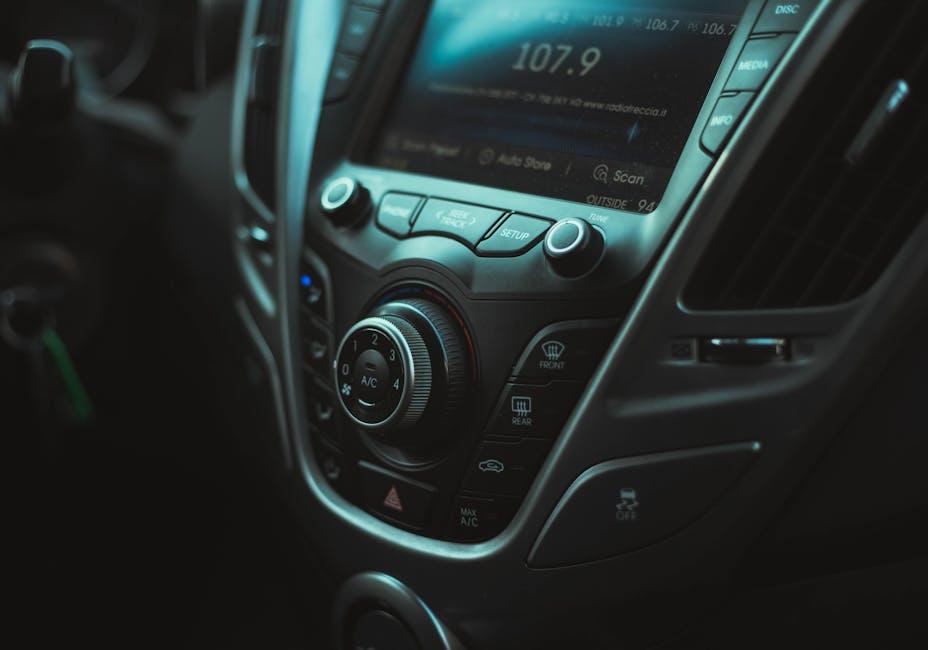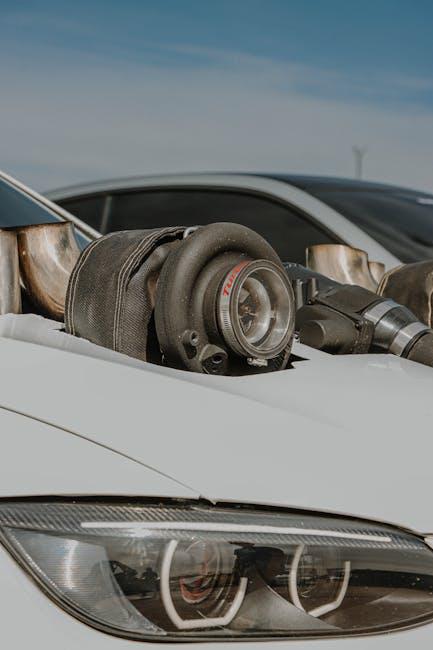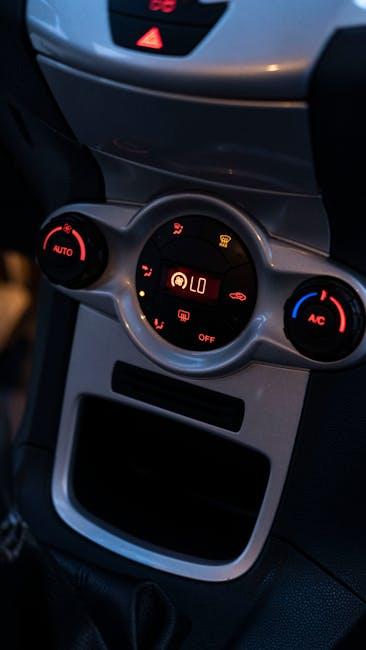Imagine stepping into your car on a scorching summer day, only to be greeted by a surprising blast of warm air instead of the refreshing coolness you expected. When your car’s air conditioning system starts blowing warm air, it’s more than just an inconvenience — it’s a signal that something under the hood isn’t quite right. In this article, we’ll explore the common reasons behind this frustrating phenomenon, helping you understand what might be causing your car’s AC to lose its chill and what steps you can take to restore that much-needed cool breeze. Whether you’re a seasoned driver or a casual commuter, knowing why your car’s AC blows warm air can save you from discomfort and costly repairs down the road.
Table of Contents
- Common Causes Behind Your Car AC Blowing Warm Air
- How Refrigerant Levels Impact AC Cooling Performance
- The Role of the AC Compressor and How to Diagnose Its Issues
- Electrical Problems That Can Lead to Warm Air from Your AC
- Simple Maintenance Tips to Keep Your Car AC Running Cold
- When to Seek Professional Help for Persistent AC Problems
- Q&A
- The Conclusion

Common Causes Behind Your Car AC Blowing Warm Air
When your car’s air conditioning starts to blow warm air, it’s often due to a variety of underlying mechanical or refrigerant issues. One of the most common culprits is a low refrigerant level, which can result from leaks in the system. As the refrigerant escapes, it becomes harder for the AC to cool the air effectively. Other causes might include a faulty compressor, which is the heart of the AC system—if it’s not working properly, the cooling cycle is interrupted. Additionally, electrical issues, like blown fuses or damaged wiring, can prevent the AC from activating when needed.
It’s also worth considering factors that might seem less obvious, such as the condition of the cabin air filter. A clogged or dirty filter can restrict airflow, making it feel like the AC isn’t cooling anything at all. Moreover, blocked condenser coils can reduce the system’s efficiency by preventing heat transfer, which negatively affects the cooling output. Below is a quick overview of typical issues and their impacts:
| Issue | Effect |
|---|---|
| Low Refrigerant | Poor cooling performance |
| Faulty Compressor | System won’t cool |
| Electrical Problems | AC doesn’t engage |
| Dirty Cabin Air Filter | Reduced airflow, warm air |
| Blocked Condenser Coils | Inefficient heat exchange |

How Refrigerant Levels Impact AC Cooling Performance
When the refrigerant level in your car’s AC system dips below the optimal amount, it directly affects how cool the air feels inside your vehicle. Think of refrigerant as the lifeblood of your AC—it absorbs heat from the cabin and releases it outside. Without enough refrigerant, this cooling cycle becomes inefficient, causing the air to blow warm even when your system is on full blast. A low refrigerant level often signals a leak somewhere in the system or inadequate charging during servicing.
Maintaining the right refrigerant balance is crucial because:
- Insufficient refrigerant leads to reduced pressure, causing the compressor to struggle and underperform.
- Overcharging
- Leaks not only waste refrigerant but can cause environmental harm and increase system wear.
| Refrigerant Level | Cooling Performance | Common Issue |
|---|---|---|
| Low | Weak or no cold air | Leak or insufficient recharge |
| Optimal | Strong, consistent cooling | Proper maintenance |
| High | Reduced cooling efficiency | Overcharging |

The Role of the AC Compressor and How to Diagnose Its Issues
The air conditioning compressor acts as the heart of your car’s cooling system, pushing the refrigerant through the AC lines to absorb and release heat efficiently. When the compressor functions smoothly, it maintains the pressure and flow necessary for cold air to circulate within the cabin. However, if there’s a malfunction such as a seized clutch, leaking seals, or internal wear, the refrigerant flow is interrupted, causing the system to blow warm air instead of refreshing cold air. Identifying compressor issues early can prevent further damage to other components like the condenser or evaporator.
To diagnose compressor problems, pay close attention to several key signs that usually indicate trouble:
- Unusual noises: Grinding, squealing, or rattling sounds when the AC is engaged often point to internal damage or clutch failure.
- Weak or no airflow: If the blower is operating but the air remains warm or weak, it might signal compressor inefficiency or refrigerant leakage.
- Physical inspection: Check the compressor clutch to see if it engages when the AC is switched on. A clutch that doesn’t engage means the compressor isn’t activating.
| Symptom | Possible Cause | Recommended Action |
|---|---|---|
| AC clutch not engaging | Electrical fault or faulty clutch | Inspect wiring and replace clutch if necessary |
| Loud grinding noise | Internal compressor damage | Professional compressor diagnosis and possible replacement |
| Warm air blowing | Refrigerant leak or compressor failure | Check refrigerant levels; repair leaks and compressor |

Electrical Problems That Can Lead to Warm Air from Your AC
When your car’s AC suddenly starts blowing warm air, one common culprit often hides beneath the hood: electrical issues. Faulty wiring or a damaged relay can interrupt the flow of power to the compressor, which is crucial for cooling. Without proper electrical supply, the compressor may fail to engage, leaving you with nothing but hot air blowing through the vents. Additionally, a malfunctioning blower motor resistor can disrupt how your fan speed controls operate, which might result in inconsistent airflow and inefficient cooling performance.
Modern vehicles rely on a complex network of sensors and electronic controls to maintain optimal AC function. Issues with the climate control module or a blown fuse within the system can halt communication between components, causing the air conditioner to underperform. Below is a quick reference to common electrical problems and their typical symptoms:
| Electrical Problem | Common Indicator |
|---|---|
| Blown Fuse | Complete loss of AC power |
| Faulty Relay | Compressor fails to engage |
| Damaged Wiring | Intermittent cooling issues |
| Blower Motor Resistor Fault | Fan speeds not working properly |

Simple Maintenance Tips to Keep Your Car AC Running Cold
Keeping your car’s air conditioning system in top shape requires some straightforward yet effective steps. Regularly cleaning or replacing the cabin air filter can significantly improve airflow and prevent dust from clogging the system. Make it a habit to run the AC for a few minutes every week, even in cooler months, to keep the refrigerant circulating smoothly and avoid compressor issues. Additionally, checking the refrigerant levels annually and topping them up if needed can stop your AC from blowing warm air.
Simple upkeep tasks like inspecting the AC compressor belt for signs of wear and tear and ensuring the condenser isn’t blocked by debris can extend the life of your cooling system. Don’t forget the electrical components; faulty wiring or blown fuses can disrupt the AC performance. Here’s a quick reference to help you remember these tasks:
| Maintenance Task | Frequency | Benefit |
|---|---|---|
| Cabin air filter check/replacement | Every 12,000-15,000 miles | Improves airflow & air quality |
| Run AC periodically in off-season | Weekly, 5 minutes | Keeps refrigerant moving |
| Refrigerant level inspection | Yearly | Prevents warm air issues |
| Compressor belt inspection | Every oil change | Avoids belt failure & AC stop |

When to Seek Professional Help for Persistent AC Problems
If your car AC continues to blow warm air despite several troubleshooting attempts, it’s a sign that professional expertise is needed. Minor issues like low refrigerant can sometimes be fixed at home, but when symptoms persist, it’s important to avoid risking further damage. Professional technicians have the right tools and experience to accurately diagnose problems that aren’t immediately visible — such as leaks in the system, faulty compressors, or electrical issues that impact your AC’s performance.
Watch out for these warning signs that indicate it’s time to book a service appointment:
- Inconsistent cooling: Your AC cools sporadically or weakly even after adding refrigerant.
- Unusual noises: Grinding or squealing sounds coming from the compressor or blower motor.
- Persistent warm airflow: No improvement in temperature regardless of fan speed or settings.
- Leaks or puddles: Visible refrigerant or water pooling under the car after running the AC.
| Symptom | Possible Cause | Recommended Action |
|---|---|---|
| Warm air only | Refrigerant leak | Professional leak detection and recharge |
| Strange noises | Compressor malfunction | Compressor inspection or replacement |
| Poor airflow | Blocked air filter or blower issue | Filter cleaning/replacement; blower check |
Q&A
Q: Why is my car AC blowing warm air even when it’s turned on?
A: When your car’s AC blows warm air, it’s often because the refrigerant level is low, preventing the system from cooling effectively. Other reasons could include a faulty compressor, clogged condenser, or electrical issues within the AC controls.
Q: Can low refrigerant cause the AC to blow warm air?
A: Absolutely. Refrigerant is the cooling agent in your AC system. If there’s a leak or it’s simply depleted over time, the system can’t absorb and release heat properly, leading to warm air coming through the vents.
Q: How do I know if my AC compressor is the problem?
A: The compressor is responsible for circulating refrigerant. Signs of a malfunction include strange noises when the AC is on, the compressor clutch not engaging, or the AC cycle frequently turning on and off. Without a working compressor, your AC can’t cool air.
Q: Could an issue with the AC condenser cause warm air?
A: Yes. The condenser’s job is to release heat absorbed from inside your car to the outside air. If it’s clogged with debris, dirt, or damaged, it won’t cool the refrigerant effectively, resulting in warm air inside the cabin.
Q: Are electrical or thermostat problems common reasons for warm air?
A: They can be. Faulty wiring, blown fuses, or a malfunctioning thermostat can disrupt AC system operation. This can prevent the compressor from running or cause incorrect temperature regulation.
Q: Is it safe to keep driving my car if the AC is blowing warm air?
A: Generally, yes. Warm AC won’t harm your vehicle mechanically, but it can make driving uncomfortable, especially in hot weather. However, if the issue is a refrigerant leak, it should be addressed soon to avoid further damage and environmental harm.
Q: What should I do if my car AC is blowing warm air?
A: Start with a professional inspection. A certified mechanic can check refrigerant levels, inspect for leaks, and test components like the compressor and condenser. Timely repairs will restore cool air and prevent more costly damage.
Q: Can regular maintenance prevent my AC from blowing warm air?
A: Definitely. Regular AC system checks, refrigerant top-ups, and keeping the condenser clean can help maintain optimal cooling performance and extend your AC’s lifespan.
The Conclusion
In the end, a car’s AC blowing warm air is more than just an inconvenience—it’s a signal from your vehicle asking for a little attention and care. Whether it’s a simple fix or a nudge toward professional help, understanding the reasons behind this unwelcome heat can keep your drives cool and comfortable. So next time your refresh button fails, remember: a warm breeze might just be the start of a cooler solution.

